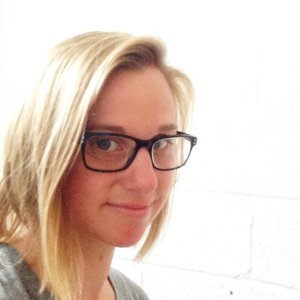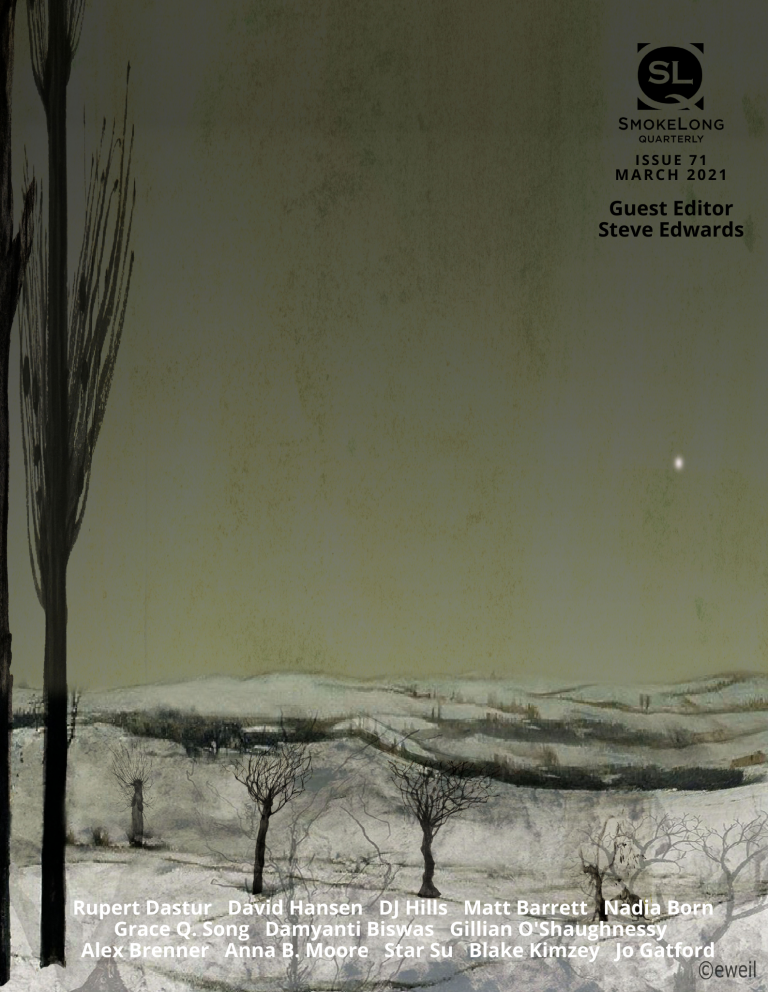What inspired you to write from the perspective of an imagined death?
I suspect it was prompted by lockdown, knowing how lonely it’s been for family and friends who live alone, worrying that I wasn’t checking in on people enough, and all the associated spiraling thoughts …. Years ago, my mum’s neighbor died alone in her house and wasn’t found for days, and the idea of that has always haunted me. So that’s where the first line came from—a “what if” situation—and it went pretty much stream of consciousness from there. But as the story developed, it became less about the hypothetical situation of the narrator’s death and more about the hypothetical but inevitable breakdown of their relationship—a kind of passive aggressive love letter in the form of a living will.
The joke about the shell, a joke only the speaker and the next of kin know, is a poignant way to characterize this loss. You have an interesting string of careers, for example, a baby massage teacher. Does this work experience inform a sense of things left unfinished?
Oof. Well. I hadn’t psychoanalyzed myself in that way before, but if we’re going there, then yeah, sure—no trajectory is ever a straight line, is it? It’s like looking back to see how you reached this particular point in life: there’s the direct path you planned out, veering off into an entirely different direction, and then there’s the scribbled mess of the journey you actually took. I wouldn’t necessarily say it comes down to unfinished business because surely nothing ever feels “finished” while we’re alive, but I enjoyed exploring the point at which things just stop. The book the narrator was halfway through. The ways they might have died, mid-task. This lingering, broken relationship that should really have ended but is somehow still continuing on, past death. What an observer might be able to glean about someone’s life from the clues they leave behind. And how all these fragments come together to make up a person. Or perhaps how they don’t even scratch the surface of representing the depth and complexity of a life, and the loss it leaves behind.
(Incidentally, the shell joke is real, but I can’t tell you what it is, obviously. My husband and I have a pact that we’ll mention it at whoever’s funeral comes first and laugh hysterically and inappropriately at the podium while everyone else looks on in horror. True love.)
You help writers who are not well funded or who have time constraints work through procrastination. What are your top three tips?
“Lower your expectations” is a big one. Very few of us have vast swathes of undisturbed time to write, and even when you are able to put aside a few hours or a full day, it’s not always realistic to expect your brain to work at full creative capacity for the whole duration. Short bursts can be really productive, but it also helps to have boundaries. Turn off the Internet if you can’t keep away from social media or get distracted by research rabbit holes. Firmly declare to interrupting family members/housemates/pets that you are not available for questions/chats/scritches for the next twenty minutes. Try to have at least a rough outline of what you want to get done before you start, so you don’t just end up staring at the blank page. Figure out where, when, and how you write best—whether that’s first thing in the morning, late at night, at the weekend, longhand, on a computer, with music, without, whatever. Then fiercely ring-fence the times you’re likely to be most productive and make the most of them.
As writers, we often end up answering many interview questions in the course of book promotion, or for individual stories in publications like SmokeLong. Do you have a least-favorite interview question? (For example, I dislike being asked about process, because process is so personal I just don’t really see how it is useful to other people—but maybe that’s just me!)
I agree that process is a very personal thing, but I also quite enjoy seeing the different ways that work for different people. I suppose being asked who my influences are is a tricky one because we’re all influenced by so many ever-changing things all the time. There are other writers I admire and would love to emulate, but I also know that’s not really possible (or useful, necessarily) and it feels weird to say I’m “influenced” by them. Just like the fragment metaphor above, we’re constantly bombarded by influences—social media, memories, random conversations, our latest hyperfixation, beloved nostalgic passions, or whatever we happen to be reading or watching that day—it’s hard to pin down just one or two. I think any piece of writing tends to be the product of a lifetime of (often subconscious) influences acquired by osmosis—or maybe a random morbid thought that just happened to expand itself into a story.



 The core workshop of SmokeLong Fitness is all in writing, so you can take part from anywhere at anytime. We are excited about creating a supportive, consistent and structured environment for flash writers to work on their craft in a community. We are thrilled and proud to say that our workshop participants have won, placed, or been listed in every major flash competition. Community works.
The core workshop of SmokeLong Fitness is all in writing, so you can take part from anywhere at anytime. We are excited about creating a supportive, consistent and structured environment for flash writers to work on their craft in a community. We are thrilled and proud to say that our workshop participants have won, placed, or been listed in every major flash competition. Community works.